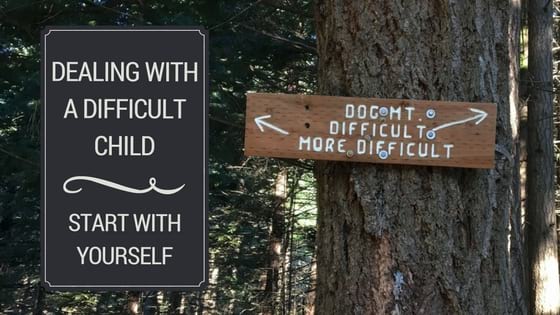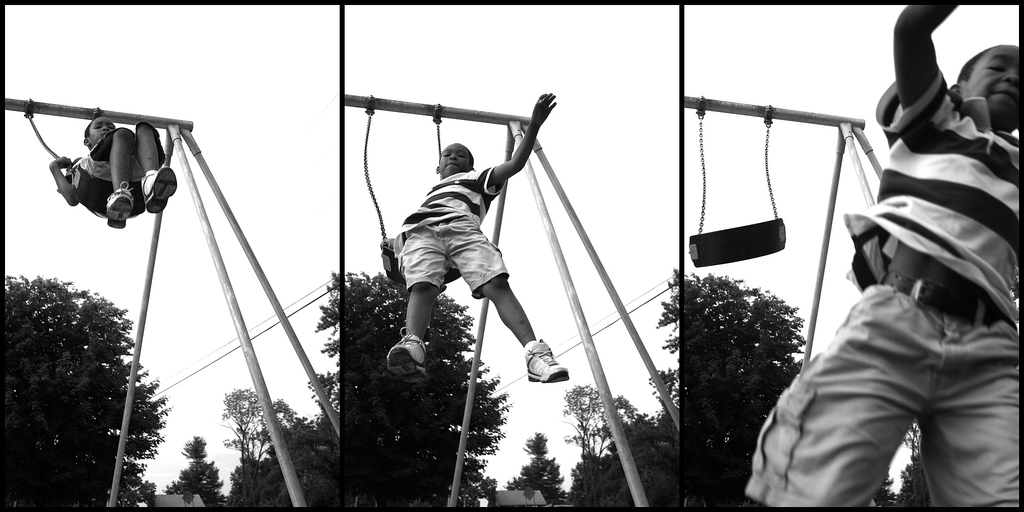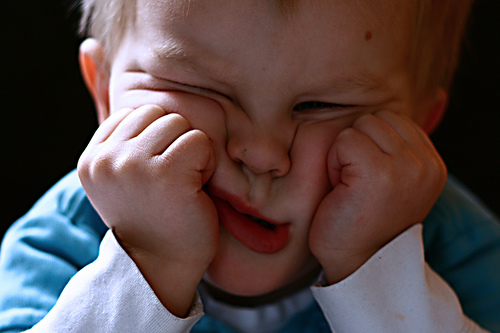This past weekend Jason, and I hiked up Dog Mountain in the Columbia River Gorge on the Oregon-Washington border. We started the hike at 6am. It was dark. With my headlamp, I could only see the part of the trail directly in front of me and the outlines of the trees all around us.
After a couple of miles, we got to a fork in the road. There was a sign with arrows pointing to either side. One arrow said, “Difficult”. The other arrow said, “More Difficult”. :)
This sign expresses what a lot of people experience in parenting. Parenting is difficult, or it’s more difficult!
Compassionate parenting, even if you know you’re on the right path, can feel like an uphill battle. It might not come naturally.
For most of us, our upbringing didn’t prepare us for the emotional demands of parenting. Even now, you might not have good role models. The steps or system to follow might not be clear.
Like me on the trail with my headlamp, you might be able to see only a few feet ahead of you. You are walking in the dark, blazing your own trail.
The most important and perhaps the most difficult part, of being a compassionate parent is…
Instead of looking outward at my child–I first look inside
But how exactly do you “look inside”? What does that actually mean?
And what if you look “inside” and see that it’s kind of a mess?
We received this email recently…
“So often I go straight to self-judgement. I think I'm not a good enough mom, I have a “problem child”, I'm the only one that can help her, I've created every problem she has. How can I do a time-in with her when I'm feeling so reactive? How do I stay with those feelings, help her, and genuinely be there? My biggest fear is that my daughter will have to struggle as hard as I do.”
How do you look inside when the judgments are high and the fear is big?
4 things to cure self-judgement in parenting:
Your child may be having a problem, but she's not a “problem child”
She’s not giving you a hard time; she’s having a hard time. If a child is having a problem you might be able to help, like a coach, to get them through it. But you’ll need to regulate yourself first. If you feel angry, guilty, or worried, you won’t be very useful.
You didn't create her problem
Let's reframe this… you got a genetic inheritance, you had certain experiences as a child, and you've got some “gunk” from your past (we all do!). The best thing we can do for our kids is to model our own self-regulation, our own growth. Role model how to care gently and compassionately for your own feelings; then tend to your child’s feelings. It's that simple, care for yourself, then care for your child. Keep the steps in that order. Don't try to do it backwards!
You don't need to be perfect
Kids only need parents who are “good enough”. Our friend, Dr. Carrie Contey says (I'm paraphrasing here) that you will pass down some of your history to your child. Your goal is to pass them less than what you got. Pass them a nice woven basket, rather than a big heavy steamer trunk!
Trying to be perfect is a trap. You will fail at being perfect. But you will always succeed at being human, being a “work in progress”. If you can love your imperfect self, your kids will know that they are worthy of your love, in their imperfectness.
If you are feeling reactive then it's okay to get some space
Say, “I'm feeling reactive right now. It's not you. I'm going to take a break so I can come back and be the parent I want to be.” Stay with your feelings… don't try to resist them. Most feelings last for 90 seconds. Then they go away!
Now it’s your turn… Are there things you say to comfort yourself when you “look inside”? How do you handle self-judgement and big feelings? Share them in the comments below!
Loving you,
Cecilia and Jason Hilkey










Thank you Cecelia and Jason for a very concise and to the point guideline……I remind myself when I start to self bash myself as a mum of two 20 and 21 year old sons that there is an expiry date for everything I have done in the past and I am here now….. I have a choice to repair and not undo something I did out of ignorance but to be there for them with who I am now without carrying the load of guilt…..its a difficult conversation with self but by becoming more self compassionate I feel more present for them now when they need me..
That’s beautiful! When we forgive ourselves of the past we can be with our kids in the present more effectively. Lovely!
Great advice thank you. I’m a single Mum of a child with special needs do I often think I have to be supermum and then when I behave in a less than desirable way I am very self critical and feel terrible. I know I’m doing it and it’s often because of the way I’m feeling. I get reactive and therefore don’t think straight. I will try to remember I am the barometer and if I’m calm and compassionate, and know that he’s not trying to push my buttons, he is just tired…life will be a lot more settled and will flow without conflict that serves no-one.
Nicky, you’re doing the work! We are calm and compassionate for our kids–when we can be–then we are calm and compassionate for ourselves when we can’t be that way with the kids.
Thank you for your post, it is a good reminder that I am not the only person struggling with parenting compassionately. What is helping me dealing with my big feelings is taking at least 3 deep breaths, walking away from the situation, dancing, taping and making sure every morning and night I am know where I am at : feelings I am having, how I want to contribute today, what will make me happy today, what was energizing during the day, what was not, what I am grateful for,, etc…
I really like the idea of your family calm plan, I think I am ready to introduce it to my 3 kids and husband. We all need a plan !
Yes! Wonderful… have a plan for the whole family! Best wishes!
She sounds really expressive for a 2 year old! I might try talking to her during a moment of connection and saying something like, “When I feel mad or sad I will do___ to take care of myself, then I come back to you. When you are mad or sad what do you do to care for yourself?” After she responds say, “Great, let’s practice our plan!” Practice calming and then coming back together. This will normalize the experience for her. Then, in the moment when you need to regulate yourself “for real”, if she gets sad tell her, “Remember this is my plan. I always come back.”
What a wonderful post. Thank you for your grace filled thoughts. I often feel so incompetent as a parent of challenging children. It helps me not to hide my feelings from my children. What I notice, is that when they see that I am struggling, often they are able to respond with much more compassion for me than I would have expected.
That’s wonderful, Lisa! Our kids are capable of so much, if we let them see our own humanity!